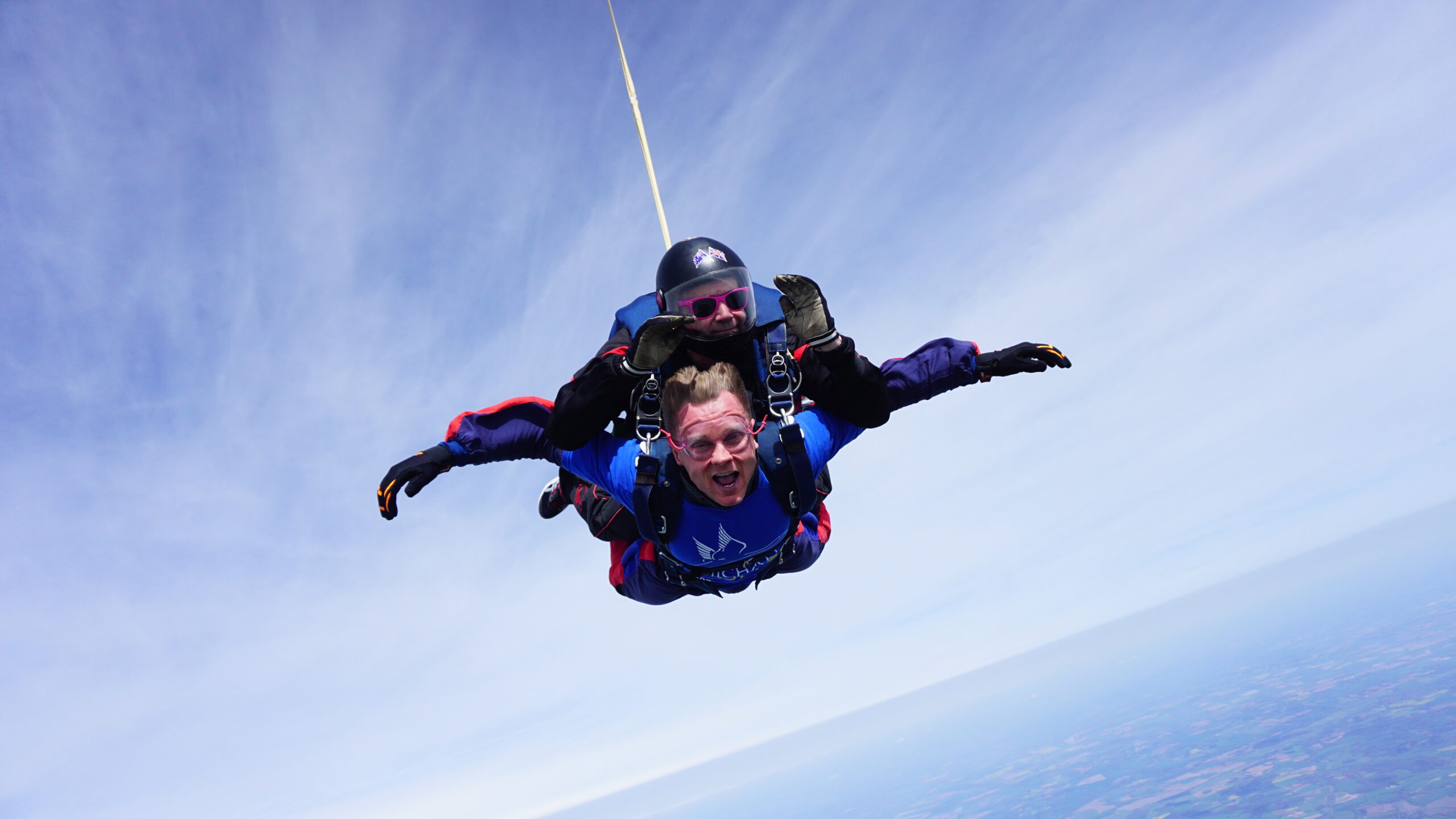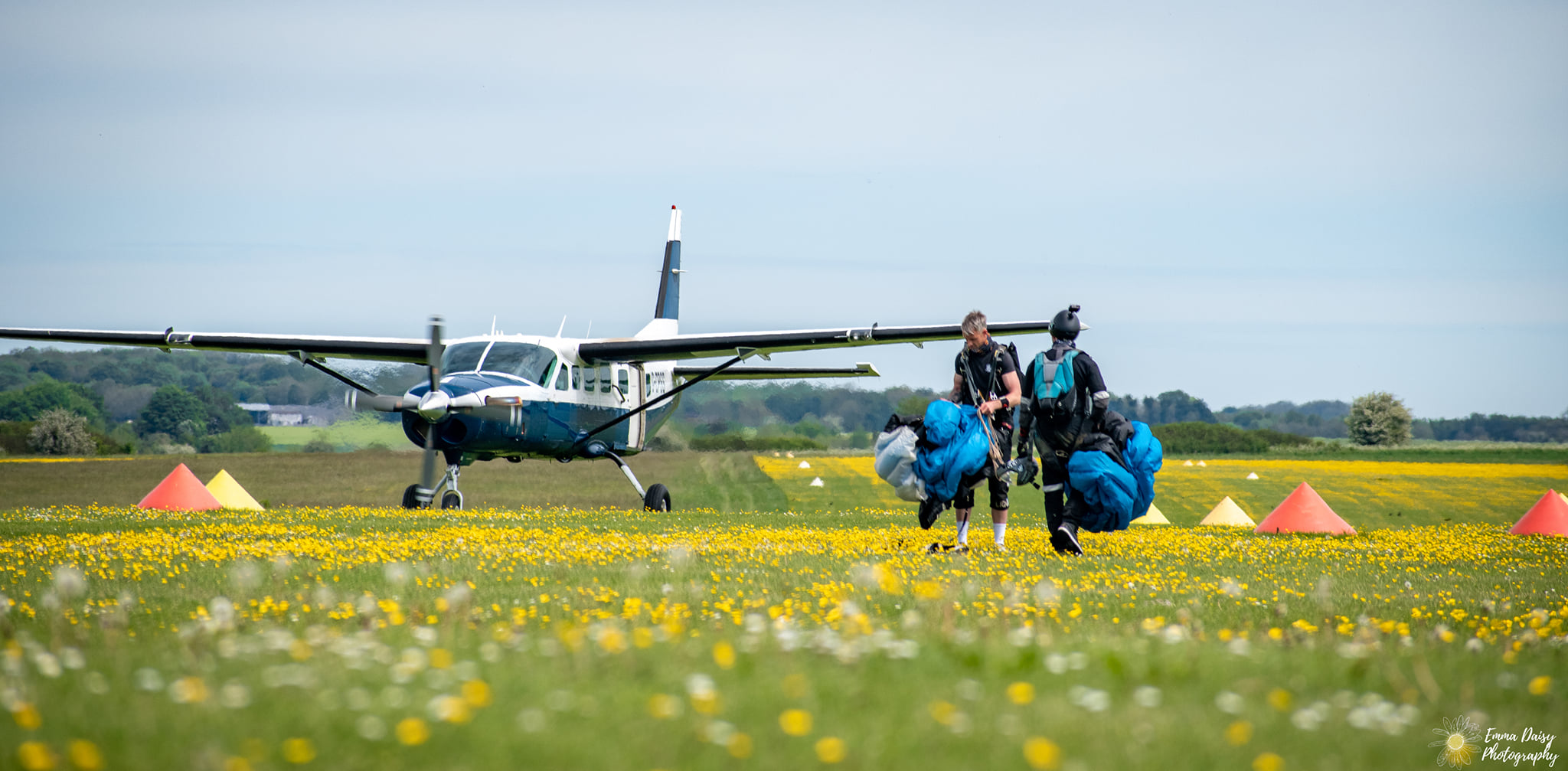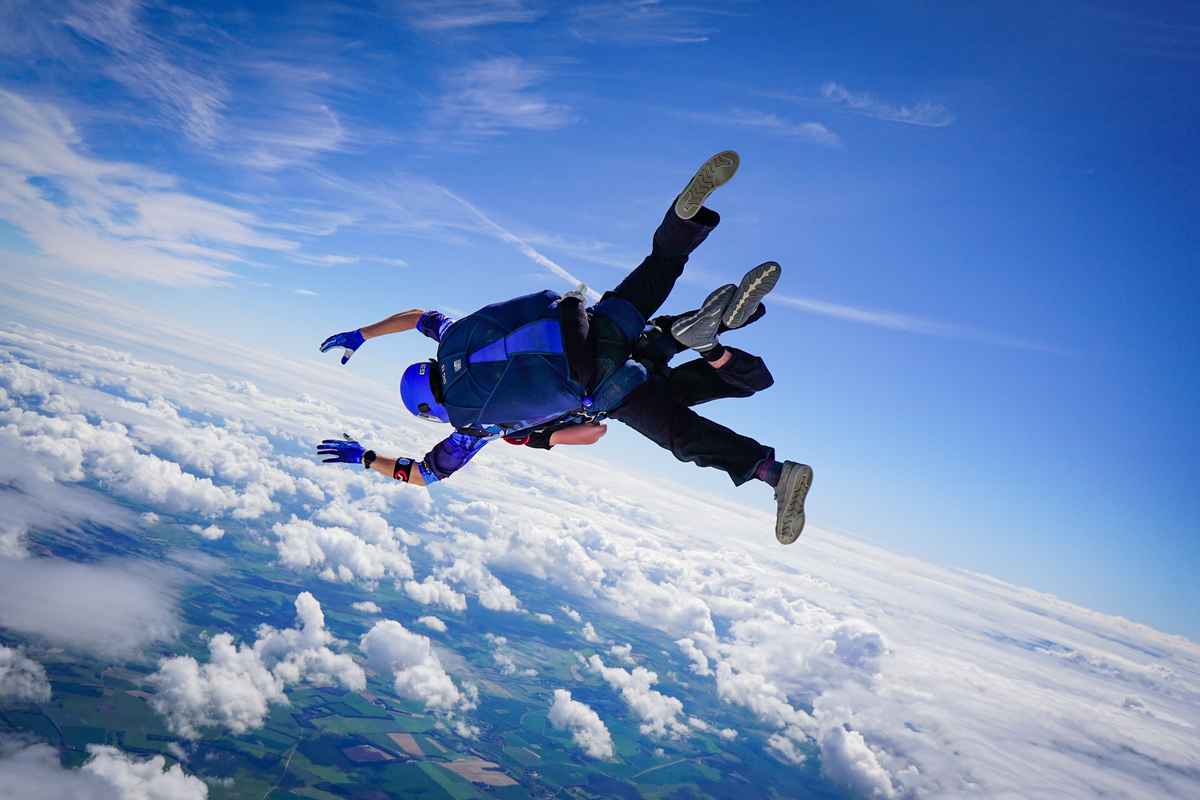Frequently asked questions
We understand you may have questions about your skydiving experience. If you cannot find your answer, please do not hesitate to contact the team.

Have a different question?
You will find our most asked questions below which will hopefully answer any queries you may have ahead of your skydiving experience.
General FAQs
Can my family member go up in the plane, but not jump?
- Unfortunately the insurance does not cover passengers in the front seat.
Should I eat before my jump?
- It isn’t a bad idea to eat something before your jump but we don’t recommend eating a heavy meal right before you are about to emplane.
What if I am scared of heights?
- Don’t worry, being in the plane, is nothing like standing at the top of a ladder. You are in safe hands, attached to an experienced instructor who will get you back to the ground safely.
Am I Insured?
- Yes and no. You become a provisional member of British Skydiving with covers third party liability. It does not cover personal accident. If you wish to have personal accident cover, you need to source this yourself prior to the jump.
Will I get any training?
- Yes. There is a short training session that takes around 20 – 30 minutes which covers everything you need to know about what to expect and what is expected of you during your skydive. Your friends and family can watch this as well if they wish.
I have just found I am pregnant! Can I still skydive?
- No. The self-declaration medical states that you are unable to skydive if you know you are pregnant. We can extended your rebooking window for you should this be the case.
Do I need to prebook my skydive?
- Yes. We can occasionally accommodate a last minute booking on the day, but you may have to wait. If you have a preferred date and arrival time, we recommend pre-booking. You can secure your booking with a £50 deposit.
Can I purchase a skydive voucher?
- Yes. We have a small range of skydive vouchers available on our website.
How high is my skydive?
- We skydive from 13,500ft here at the APA. This equates to almost a minute of freefall at speeds of around 120mph! The parachute will be opened at 6,000ft.
Who packs my parachute?
- We have a small team of qualified and experienced ‘packers’ who are on standby to pack the parachute ready to be jumped again 15 minutes later.
Is there somewhere we can sit and watch?
- Yes, we have plenty of outdoor seating available.
Is there somewhere we can eat?
- Yes, we have a canteen that opens and sells hot drinks, cold drinks, snacks, breakfast baps and various lunch options. If you have a specific dietary requirement, we do recommend bring your own food just in case the options have sold out.
Can I bring my own food and drink?
- Yes however only alcohol purchased at the APA can be consumed onsite.
Can I smoke onsite?
- No. As we are on an MOD site, there is a strict no smoking policy. You can however use e-cigarettes whilst outside.
Tandem FAQs
Can my friends and family watch?
- Yes! We have plenty of space here at the APA both inside and outside.
- Under 16’s are also welcome but must be accompanied by an adult.
- There aren’t any other activities to do here, and skydiving can become a full day event. If you bring children, please bring activities with you.
Can I bring my dog?
- No! Unfortunately, as we are based on an MOD site, there is a strict ‘NO VISITING DOGS’ policy. If you do bring your dog, you will not be permitted onsite.
What should I wear for a skydive?
- We recommend wearing comfortable clothing and trainers. This could be active wear, comfortable jeans and a jumper etc.
- Footwear must not have hooks.
- In the cooler months, we recommend layering up.
- If you would like to wear a jumpsuit for your skydive, just ask your instructor on the day.
Can I wear glasses or contact lenses for a skydive?
- Yes. We can provide you with goggles that fit over your glasses.
- Note that contact lenses can become dislodged if goggles are not fitted tightly.
- If you are concerned, please talk to your instructor on the day.
Do I need a medical to skydive?
- Yes! Most people can self-declare their health and fitness with the following form – 115a.
- If you have read the form and are unable to sign this. You will need a doctor’s certificate – 115b.
- We are aware some doctors may be too busy to sign your form. If this is the case, we can point you in the direction of a private doctor who is also a skydiver and is local to the centre.
What happens if the weather is not good enough for my skydive?
- If the weather does not look suitable for skydiving, we will email you the day before.
- If the weather looks changeable or difficult to predict, we would give you the option of rescheduling.
- If the weather looks great, you won’t hear from us.
- If you have any doubts about the weather, we do recommend calling us the day before.
- We need to be able to see the ground from the aircraft and for wind gusts to remain under 20 knots to be able to safely carry out a skydive.
- The deposit is non-refundable. Skydiving is a weather dependent sport.
- If your jump is postponed – you can reschedule to any chosen weekend at no extra charge.
- Please note that you have 12 months to carry out your tandem skydive if your jump gets cancelled after you have attended your training session. If over 12 months pass, there is an additional £30 fee for your British Skydiving provisional membership.
What happens if I fall ill before my skydive?
- You can reschedule at no extra cost! We recommend feeling well before carrying out a skydive due to the extreme nature of the sport!
- We do not recommend skydiving with a cold as the change in pressure can affect your sinuses.
Is there an age limit to skydive?
- Yes. You must be over 18 years of age.
- If you are under 18 but over 16 years of age, you may still be able to skydive, but you will need parental permission and they must be happy to sign your forms.
Is there a weight limit to skydive?
- Yes. There is a maximum weight limit of 16 stone to be able to carry out a skydive. This is due to the limitations of the kit.
- There is no minimum weight limit.
What time will my skydive take place?
- Unfortunately, we cannot give you an exact jump time.
- The jump programme is organised in order of arrival and the plane turnaround is around 20-25 minutes.
- We do recommend allowing a full day for your skydive in case we experience unexpected weather delays.
- Most tandem skydive participants spend around 4 – 5 hours here on a perfect weather day and we aim to get you in the sky and back down again within this time frame but unfortunately, we cannot guarantee this.
- Around 25 minutes prior to your skydive, you will be called to get ready for your jump. Once in the plane it takes around 25 minutes to climb to 13,500ft. Once out of the plane you will experience around 1 minute of free fall and around 5 minutes under the parachute before landing safely back on the ground.
- If you have your skydive filmed, this will be emailed to you, and you do not need to wait for it.
AFF FAQs
How much does it cost to learn to skydive?
- The AFF course can be split into cost per level. We charge £390 for the Initial ground training and level 1 skydive. This also includes a provisional British Skydiving membership which is valid for your level 1 only.
- The total cost for the AFF course is £2020. This includes the above as well as the remaining levels 2 – 8 and 10 solo consolidation jumps.
- You will need full British Skydiving membership to proceed with your level 2 onwards and can be purchased online through the website. This price varies depending on the time of year and is required for all skydivers who wish to jump in the UK.
- The AFF course prices include kit hire and packing and the cost of the instructors. You will need to purchase your own goggles and logbook should you wish to continue with the course.
- There is a small charge to apply for your license with British Skydiving once the chief instructor is happy you have fulfilled the requirements to apply.
Is there a minimum age to learn to skydive?
- Yes. You must be over 18 years of age. If you’re older than 16 but younger than 18, you may still be able to carry out the course but you must have parental permission and they must be happy to sign your forms.
Is there a maximum weight limit?
- Yes. The maximum weight limit of the kit is 14 stone.
Do I need a medical to skydive?
- Yes! Most people can self-declare their health and fitness with the following form – 115c.
- If you have read the form and are unable to sign this. You will need a doctor’s certificate – 115d.
- We are aware some doctors may be too busy to sign your form. If this is the case, we can point you in the direction of a private doctor who is also a skydiver local to the centre.
What should I wear for a skydive?
- We recommend wearing comfortable clothing and trainers. This could be active wear, comfortable jeans and a jumper etc.
- Footwear must not have hooks.
- In the cooler months, we recommend layering up!
Can I wear glasses or contact lenses for a skydive?
- Yes. We can provide you with goggles that fit over your glasses.
- Note that contact lenses can become dislodged if goggles are not fitted tightly.
- If you are concerned, please talk to your instructor on the day.
What do I do if the weather is not good after I have completed my ground training?
- Once you have completed your ground training, you have 3 months to complete your skydive. If over 3 months pass, you will need to carry out additional ground training which does come at a cost.
- You do not have to jump the day that follows your ground training but we do recommend leaving as little time as possible in between training and/or jumps.
- We need to be able to have good visibility of the ground from the aircraft and wind gusts to remain under 15 knots to carry out student jumps safely.
Do I need to book my skydive/s after training?
- You will need to join our ‘Netheravon Skydiver’s’ Facebook group where booking forms are posted on a week by week basis – this is so we can plan ahead and so the guard room know who to expect.
- You can jump on any weekend that the weather permits.
Static Line FAQs
Can I book a static line course?
- At present, our static line calendar is fully booked for cadet units across the country as we are the only centre of excellence recognised by the cadets.
- If you wish to become a qualified skydiver, we recommend the AFF route. The key is in the name – Accelerated Freefall.
- If you are a cadet unit wishing to enquire – please contact the office.
Is there a minimum age to learn to skydive?
- Yes. You must be over 18 years of age. If you’re older than 16 but younger than 18, you may still be able to carry out the course but you must have parental permission and they must be happy to sign your forms.
Is there a maximum weight limit?
- Yes. The maximum weight limit of the kit is 14 stone.
Do I need a medical to skydive?
- Yes! Most people can self-declare their health and fitness with the following form – 115c.
- If you have read the form and are unable to sign this. You will need a doctor’s certificate – 115d.
- We are aware some doctors may be too busy to sign your form. If this is the case, we can point you in the direction of a private doctor who is also a skydiver local to the centre.
What should I wear for a skydive?
- We recommend wearing comfortable clothing and trainers. This could be active wear, comfortable jeans and a jumper etc.
- Footwear must not have hooks.
- In the cooler months, we recommend layering up!
Can I wear glasses or contact lenses for a skydive?
- Yes. We can provide you with goggles that fit over your glasses.
- Note that contact lenses can become dislodged if goggles are not fitted tightly.
- If you are concerned, please talk to your instructor on the day.
What do I do if the weather is not good after I have completed my ground training?
- Once you have completed your ground training, you have 3 months to complete your skydive. If over 3 months pass, you will need to carry out additional ground training which does come at a cost.
- You do not have to jump the day that follows your ground training but we do recommend leaving as little time as possible in between training and/or jumps.
- We need to be able to have good visibility of the ground from the aircraft and wind gusts to remain under 15 knots to carry out student jumps safely.

Download our Information Guides
Click below for information packs where you will find medical forms and checklists which will help you prepare for your experience.

book a tandem skydive or course with us
Follow the team on social media
See what we have been up to and what we have in the pipeline.